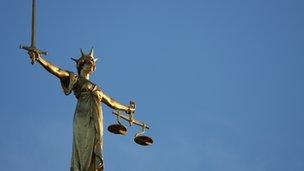Commons backs plans for secret courts
- Published

Critics say it should be judges not ministers who have the final say on what can be heard in public
MPs have voted to back plans to allow more civil courts to examine secret intelligence in private, despite calls for more safeguards.
MPs from all sides had tried to press for so-called secret courts to be used only as a last resort.
But the government successfully saw off the challenge.
Cabinet minister Ken Clarke said it was "common sense" for sensitive evidence to be admissible in trials without intelligence sources being exposed.
Two Labour amendments, which attempted to introduce extra safeguards, were defeated by 297 to 226 and by 298 to 225 - government majorities of 71 and 73 respectively.
Shadow justice secretary Sadiq Khan said he was "disappointed" with the result, but would look to the the House of Lords to "bring some balance to the government's plans" when the legislation returns there.
'Unfettered discretion'
Ministers are concerned that millions of pounds have had to be spent settling civil claims which the government was prevented from challenging successfully, because that would have involved revealing secret intelligence in open court.
The government has already introduced more safeguards to the legislation currently being scrutinised by Parliament, ensuring that judges and not ministers decide when so-called closed material proceedings are used.
But some MPs argued that secret courts should be used only as a last resort when national security outweighs the public interest of having open justice.
Seven Liberal Democrats MPs rebelled to support Labour's amendment, which would have put in place this public interest test, including president Tim Farron, deputy leader Simon Hughes and former minister Sarah Teather.
But several former Labour ministers chose to back the government's position, including former Home Secretary Jack Straw and former counter terrorism minister Hazel Blears.
Minister without portfolio Ken Clarke, in charge of the bill's passage, said "enormous" improvements had been made since the legislation was first drafted and judges would have "unfettered discretion" to decide whether to hold proceedings in private.
This, he said, could only happen in national security cases where the safety of British citizens or threats to international order were possible and not situations where governments had simply "made a pig's ear" of things.
"We have every protection on the face of the bill," he told MPs. While the government had accepted a large number of amendments to the proposals, he said further calls for change amounted to "human rights lawyers clasping at straws".
'Standards of general justice'
Ahead of Monday's debate, Lord Woolf - a former Lord Chief Justice and crossbench peer - said the government's amended plans would retain "the standards of general justice" while ensuring that all sides can put their case and judges are not "blindfolded" by not being able to test certain evidence.
"They will ensure that both the government and the claimant are given the greatest opportunity to put their case and that concerned citizens will have the benefit of a final judgement on whether serious allegations have foundation," he wrote, external in a letter to the Times.
But Conservative MP Andrew Tyrie, who rebelled against the government, said he believed Lord Woolf was mistaken and too much power would lie in the hands of the government.
"They (the amendments) are really about the kind of society we want to live in, about whether people can get to hear the case made against them, and whether we can keep legal safeguards we have had for generations," he told MPs.
Responding to Lord Woolf's intervention, Reprieve - which campaigns to uphold the human rights of prisoners - said it was "hard to see how a case in which you cannot hear or challenge the evidence used against you can be described as meeting the standards of general justice".
The government suffered a series of defeats on the proposals in the House of Lords in November and is likely to encounter continued opposition when the legislation returns to the Upper House in the coming weeks.
- Published18 December 2012
- Published21 November 2012
- Published21 November 2012